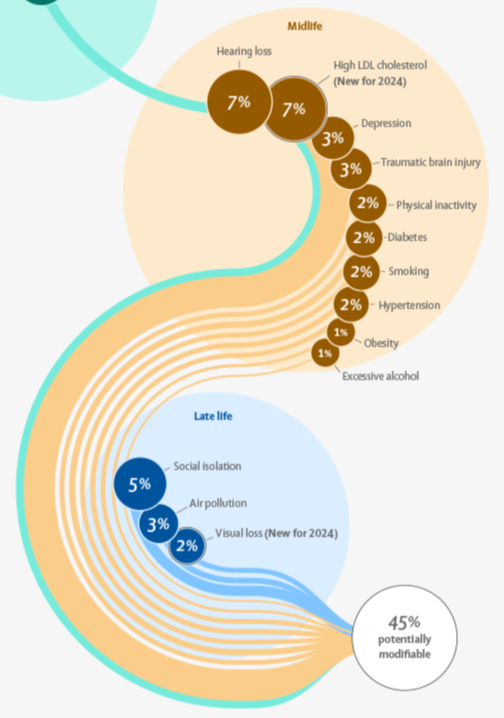The world's leading dementia experts identified 14 factors you can change that account for nearly half of all dementia cases
The Lancet Commission on Dementia Prevention is your roadmap to improved cognitive health
The Lancet Commission on Dementia Prevention, Intervention, and Care brings together the world's leading dementia researchers to evaluate the latest evidence on preventing and managing cognitive decline. First published in 2017 and updated in 2020 and 2024, the Commission's reports have become the definitive global reference for dementia prevention.
Their central finding is transformative: approximately 45% of dementia cases worldwide could be prevented or delayed by addressing modifiable risk factors throughout the life course.
-
The elimination of 14 potentially modifiable risk factors could result in a 45% reduction of dementia cases. Those risk factors include:
Early Life (under 45 years)
Less education: 5%
Midlife (45-65 years)
Hearing loss: 7%
High LDL cholesterol: 7%
Depression: 3%
Traumatic brain injury: 3%
Physical inactivity: 2%
Diabetes: 2%
Smoking: 2%
Hypertension: 2%
Obesity: 1%
Excessive alcohol: 1%
Later Life (over 65 years)
Social isolation: 5%
Air pollution: 3%
Vision loss: 2%
Total potentially preventable: ~45%
-
The Commission's findings are both sobering and hopeful. Yes, dementia affects millions of families. But nearly half of cases may be preventable through actions you can take at any age.
The key insight: it's never too early and never too late to start protecting your brain.
In early life, education builds cognitive reserve.
In midlife, managing cardiovascular risk factors and staying active preserves brain health.
In later life, staying socially connected and addressing sensory impairments continues to matter.
-
Bottomline: you can change your risk for developing dementia.
By staying active physically, mentally, and socially; making healthy choices about drinking, smoking, and diet; and by managing your heart health, you can significantly reduce your overall risk of developing dementia.
-
The 2024 Lancet Commission used compelling new research to add vision loss and high LDL cholesterol to the 12 modifiable risk factors identified in the 2020 report.
Dementia research is ongoing. Further risk factors like poor sleep, unhealthy diet, infections, mental health conditions, and menopause are all topics of interest which warrant additional research.
-
The Lancet Commission’s latest report reinforces everything we already knew about lifestyle and dementia and adds to our understanding of modifiable risk factors. It reiterates that dementia is not inevitable, but is highly influenced by modifiable lifestyle choices. It gives reason to hope and empowers people like you to take control of their cognitive health.
Report Overview
Take control of your risk factors
Mindr assesses your current habits across all six brain health domains and help you implement new brain healthy behaviors one day at a time.


